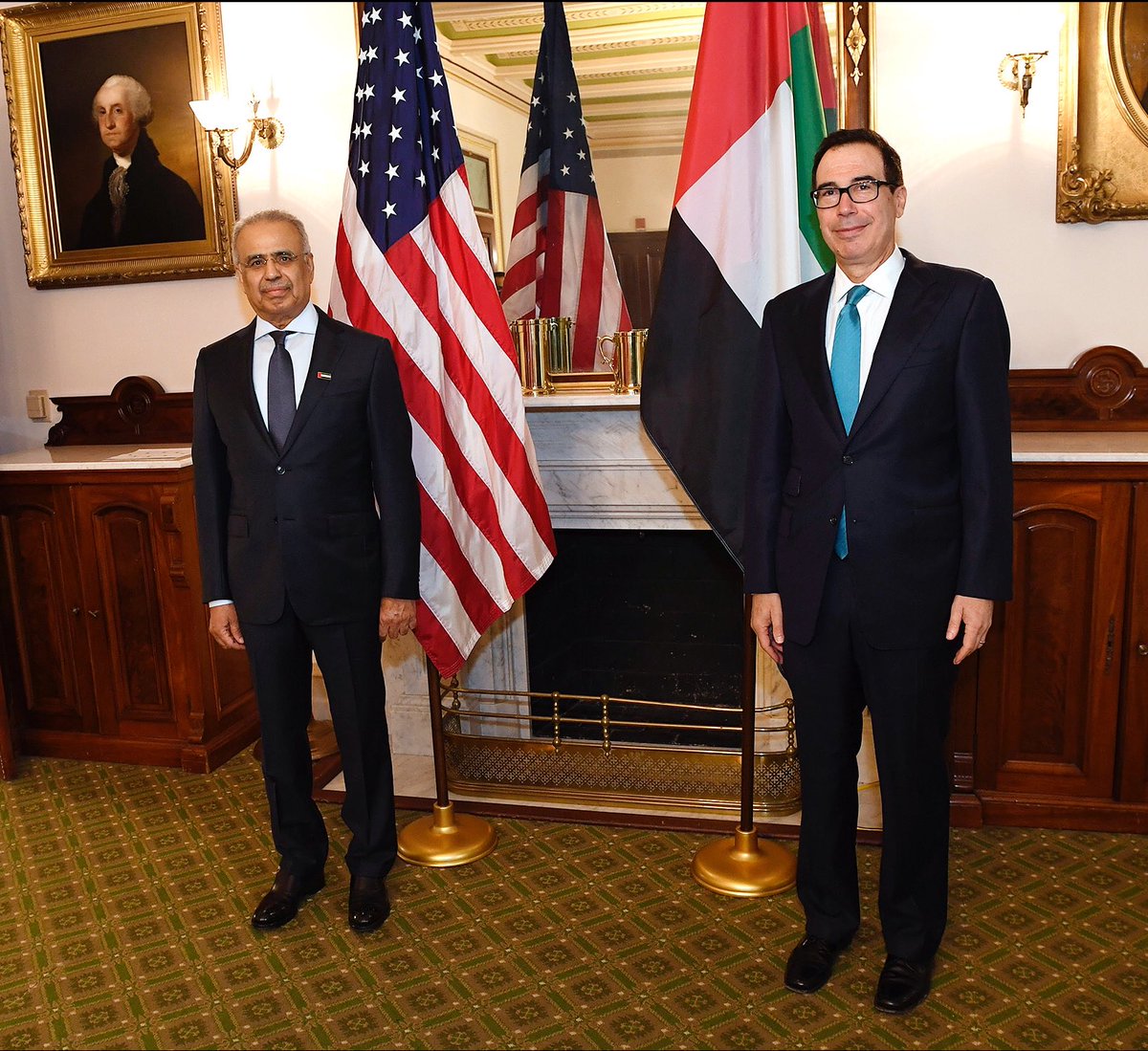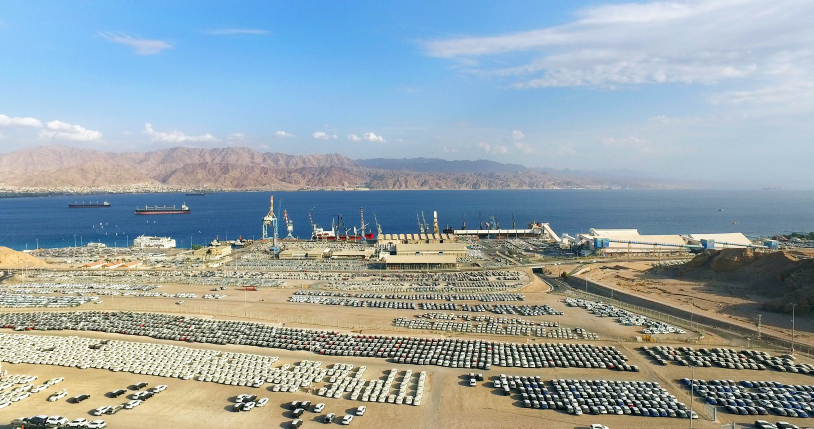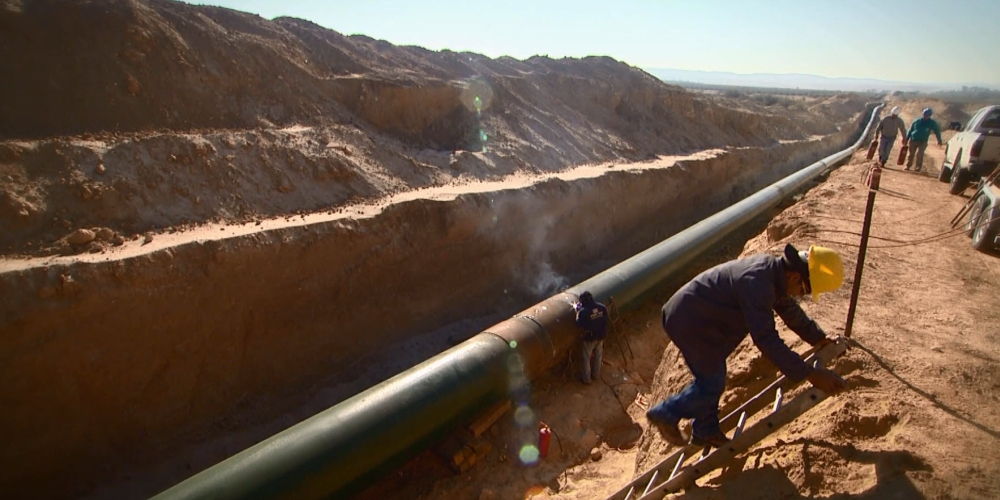(September 23, 2021 / JNS) It was hailed as the first major partnership to come out of the Abraham Accords—a deal in which Israel would serve as an artery for Emirati crude to Western markets. The lucrative deal, reportedly worth hundreds of millions, was inked on Oct. 19, 2020, by Israel’s state-owned Europe Asia Pipeline Co. (EAPC) and MED-RED Land Bridge Ltd., a private Dubai-based company.
An Israeli “land bridge” transporting oil from Eilat on the Red Sea to Ashkelon on the Mediterranean already exists; it has been operating for more than 50 years. In fact, there are two pipelines between the cities: one for crude oil and one for distillates (gasoline, jet fuel, etc.). While the pipeline isn’t new, pumping Arab oil through it is, at least in such a publicly celebrated manner.
“Since the establishment of the state, Israel has been dealing with the Arab boycott and its consequences,” EAPC said in a statement. “These agreements are, in fact, the practical expression of improving relations between the State of Israel and the Gulf states.”
Then-United States Treasury Secretary Steven Mnuchin, who was present at the signing, called it a “significant breakthrough that was made possible thanks to the Abraham Accords,” the normalization treaty signed between Israel, the United Arab Emirates and Bahrain a month earlier.
But the agreement has encountered growing opposition from environmentalist groups and Israel’s Ministry of Environmental Protection. The Eilat oil terminal is roughly 200 yards from coral beaches. While those favoring the deal focus on its geo-strategic importance, opponents say it poses an unacceptable risk to the coral reefs.
One of the earliest critics was environmentalist group Zalul, which issued a statement immediately after the October 2020 signing, calling the intention to bring more oil tankers to Eilat “a mortal danger.” Zalul then organized a coalition of 20 green groups to fight what they termed “the transformation of Eilat and Ashkelon into oil cities.”
Bolstering their campaign in January was a letter signed by 231 scientists from Israel and abroad warning of the risks to Eilat’s coral and urging the Israeli government to prevent the agreement from going through.

Former U.S. Secretary of Treasury Steven Mnuchin with UAE Minister of State for Financial Affairs Al Tayer. Source: Mnuchin/Twitter.
On May 4, three Israeli environmental groups petitioned the Supreme Court for a temporary injunction to freeze the agreement, arguing that the deal was conducted in secret and that the EAPC, “which presumably anticipated opposition to the agreement, chose to hide it, both from the public and from the government itself.”
‘It’s not doing business like other companies do’
Asaf Ben Levy, legal adviser to the Society for the Preservation of Nature in Israel (SPNI) who helped work on the lawsuit and will present the case in court for SPNI, told JNS that “no one in the government, in the ministry of environment or energy knew about the agreement, about its exact contents.”
Gila Gamliel of the Likud Party, then Minister of Environmental Protection, appeared to confirm this on May 9 when she announced at a committee meeting dealing with maritime disaster scenarios that her ministry had not been looped in on discussions about the agreement.
The EAPC “operates as if it is a completely private corporation, but it isn’t. It is, or it should be by the law, regulated by the government. … It isn’t like any other company, and it’s not doing business like other companies do,” said Ben Levy.
EAPC’s agreements are confidential by law, due in part to the company’s history. Set up in 1968 as a joint project with Iran when the countries enjoyed warmer relations, its pipeline once funneled Iranian crude from Eilat to the Mediterranean. To end the legal partnership with Iran, which despite being a sworn enemy still demanded revenues from its share of the pipeline venture, Israel passed a law in 2017 specifically geared for the EAPC, then known as the Eilat Ashkelon Pipeline Co., renaming it the Europe Asia Pipeline Co.
The law states, “Any information concerning [EAPC], including its oil transactions and value … will be considered confidential information.” The law also converted EAPC into a state-owned company under the supervision of the Ministry of Finance.
This may be in part why the Supreme Court rejected the petition for a temporary injunction. Sources familiar with EAPC told JNS that the judges recognized that the company was acting in accordance with its business charter and established activities.
Bar Levy said it may have had more to do with the fact that the government, named as a defendant in the lawsuit (for failing to oversee the agreement), asked for more time to respond to the petitioners. “Usually in the Israeli court, the arguments of the government are treated very seriously,” said Bar Levy.

Aerial view of the southern Israeli city of Eilat, on Oct. 21, 2015. Photo by Moshe Shai/Flash90.
In its response to the suit, the pipeline company said it not only conducted business as usual when it signed the MED RED agreement, but rejected the charge that it purposefully hid its activities from various government ministries, which in any case it’s not required to report to in connection with its business dealings.
The company said it had approached the Ministry of Environmental Protection immediately after signing the memorandum of understanding in October 2020, stressing that this was several months before the actual agreement was signed.
JNS obtained emails confirming the company reached out to the Environmental Ministry on Oct. 22, two days after the memorandum of understanding between it and MED RED was signed. In an email to Rani Amir, director of the ministry’s National Marine Environment Protection Unit, EAPC’s CEO Itzik Levy “requests/suggests” that a joint team of representatives from the company and the ministry be established to prepare for the increased frequency of oil tankers expected to start arriving in Eilat by mid-2021.
The EAPC said in its response to the suit, “Such a team was established immediately and since October 2020 there has been an ongoing dialogue between the company and the professional echelon in the Ministry of Environmental Protection in order to ensure the continued operation of the company while strictly maintaining the values of marine and environmental protection.”
JNS reached out to the ministry for comment. It would only say that “at this stage, a working meeting with EAPC will be scheduled in a coordinated manner within a few weeks.”
EAPC has also argued that its MED RED agreement is no different than dozens of other agreements it has signed, and that, in fact, it has signed much larger ones. Bar Levy said that the difference this time is the threat to the coral reefs.
“Until recently, the amount of oil that used to come to Eilat port and then transfer to the pipeline to Ashkelon and from there to Europe was a very minimal amount,” he said. “The environmental danger was limited. This changed when this agreement was signed,” noting more oil tankers have already begun to arrive as the agreement is already being implemented.
The new Minister of Environmental Protection, Tamar Zandberg of the Meretz Party, who has expressed her opposition to MED RED, ordered her ministry to freeze further examination of the EAPC’s preparations at the Eilat terminal for more tankers until the government holds a full discussion on the agreement. (Sources told JNS that EAPC would welcome a government debate on the deal.)
The environmental ministry also rejected a risk assessment report commissioned by the EAPC to look at the agreement’s environmental impacts and which was presented to the ministry on July 11, saying it ignored the ministry’s guidance for conducting such a report.
The survey, which JNS reviewed, examined three scenarios and found: 1) the likelihood of damage to a tanker hull resulting in the loss of a substantial amount of oil was one in 366,300 years 2) the likelihood of a leak in the pipeline that leads from the shore to the loading arms at the ship was one in 1,111 years; and 3) a leak from the lines connecting to the ship was one in 24 years. It said such a leak would not reach the water due to a spill containment pallet.
While the company has made wide use of the numbers, saying it shows the risk of a leak is “zero,” environmentalists have ridiculed the EAPC’s claims.
“If the probability of an oil leak in the pipeline is one in 1,111 years, I think that [the EAPC] should fill out a lottery ticket,” said Bar Levy, noting there have been several leaks from the pipeline, notably in 2011 and 2014. The Environmental Protection Ministry rated the latter as one of the worst ecological disasters in the country’s history, in which 1.3 million gallons spilled into a nature reserve.
The company suffered another leak on Aug. 29 in its pipeline transporting crude oil from Ashkelon to Haifa. The EAPC said the leak was small, covering less than an acre. The environmental ministry, however, ordered the pipeline closed for inspections expected to last 21 days, according to reports.

A view of the Eilat-Ashkelon pipeline. Credit: EAPC.
‘Coral reefs of Eilat have importance to entire globe’
Amatzia Genin, professor of biological oceanography and marine ecology at the Hebrew University of Jerusalem and a resident researcher at the InterUniversity Institute for Marine Sciences of Eilat, was one of the signatories of the scientists’ letter published in January. He told JNS that the risk to the coral reefs is “immense” from an influx of oil tankers. (The exact number of tankers involved is unclear. Environmentalists put it as high as 200. Sources close to EAPC said it is in the range of a few dozen.)
Of the EAPC’s risk assessment, he said, “What would Exxon claim were the chances of an oil tanker running ashore in Alaska? What would BP claim about an explosion of an oil well in the Gulf of Mexico? They also can say once every 300,000 years. It happened.”
“The risk in Israel is not like in Alaska or the Gulf of Mexico,” said Genin. “What I’m worried about is that we have rockets and missiles shot at us.”
He noted that during Israel’s 11-day conflict with Hamas in Gaza in May, Hamas struck an EAPC-owned oil tank in Ashkelon. “If you have 200 tankers a year and each one is docking there for a day-and-a-half, it means that at any given time you have a tanker around us, and it can be targeted.”
Genin argued that the coral reefs in the Gulf of Eilat are unique in that they can withstand a wider range of temperatures than any other corals. As a result, Eilat’s reefs are the world’s only corals that haven’t experienced bleaching. “The coral reefs of Eilat have importance to the entire globe now that the globe is losing corals at a high rate,” he said.
The company has taken umbrage at accusations that it doesn’t care about the corals. It said environmentalist groups ignore the fact that its safety protocols meet the highest international standards, pointing to, among other things, a $10 million upgrade to its pipeline system, a sea barrier with which it surrounds ships at its Eilat terminal and an investment in a $5 million vapor combustion unit in Eilat to deal with noxious fumes.
EAPC also said that opponents ignore the worldwide decline in tanker accidents thanks to improved technical standards and international oversight. It said that in both 2020 and 2019, there were only three incidents of an oil tanker spill into the sea exceeding seven tons.
“The total amount of oil spilled into the sea in these two years was about 1,000 tons per year … compared with an annual average of about 320,000 tons in the 1970s,” it said. “This decrease occurred against the background of a doubling of the amount of fuel transported in the world, less than 1.5 billion tons in the early 1970s to about 3.3 billion tons in recent years.”
EAPC said that its environmentalist opponents act as if future damage to the reefs is an “absolute” certainty and every other consideration must be subsumed to that danger, not least of which is the risk canceling the deal poses to the Abraham Accords.
“Canceling the agreement is likely to cause significant damage to the State of Israel’s foreign relations,” it said, claiming that Foreign Ministry staff told the company that breaking the agreement not only will harm the Abraham Accords but damage “relations that are being formed between Israel and the Gulf States.”
The Ministry of Foreign Affairs told JNS it would not comment on the matter.
The deal’s opponents suggest that the EAPC is using the Abraham Accords cynically and that the pipeline agreement is between two companies, not between the UAE and Israel. However, reports from anonymous UAE officials in the media paint a different picture—that annulling the deal could have diplomatic repercussions.
A former senior Trump official was even less equivocal, telling JNS that an Israeli pullout from MED RED would most certainly have a negative impact on the accords.
"oil" - Google News
September 23, 2021 at 11:44PM
https://ift.tt/39vYpMH
Israeli pipeline company embroiled in conflict over UAE oil deal - JNS.org
"oil" - Google News
https://ift.tt/2PqPpxF
Shoes Man Tutorial
Pos News Update
Meme Update
Korean Entertainment News
Japan News Update
Bagikan Berita Ini














0 Response to "Israeli pipeline company embroiled in conflict over UAE oil deal - JNS.org"
Post a Comment